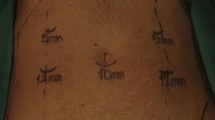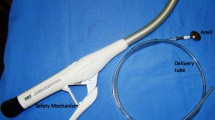Abstract
Background
An increasing number of minimally invasive oesophagogastrectomies (MIOG) are being performed. However, the complexity of the surgical skills required and the steep learning curve have thus far confined the minimally invasive approach to selected tertiary centres. The oesophagogastric and the oesophagojejunal anastomosis can be challenging and often time-consuming. The recently developed transorally inserted anvil (OrVil™) is a technique aimed to simplify the anastomotic procedure. The aim of the study was to evaluate the safety, feasibility, and efficacy of OrVil™-assisted anastomosis during laparoscopic surgery in a tertiary upper-GI cancer centre.
Methods
From July 2008 to July 2010, 53 consecutive patients underwent MIOG for cancer performed by one surgeon at our institution. Thirty patients underwent laparoscopic Ivor-Lewis oesophagectomy (ILO) and 23 patients underwent laparoscopic gastrectomy. Of the latter group, 13 had a total gastrectomy (TG) and 10 had a subtotal gastrectomy (SG). The gastrointestinal anastomosis was checked with intraoperative endoscopy in all cases.
Results
There were three in-hospital deaths. Median hospital stay was 14 days for oesophagectomies and 11 days for gastrectomies. There were three anastomotic leaks (5.6%), all in the oesophageal group, successfully treated conservatively. Two patients needed conversion to open surgery (3.7%), 3 patients (5.6%) required re-exploration (for bleeding, infected haematoma, and diaphragmatic hernia), and 18 patients (34%) had respiratory complications (pneumonia, pleural effusions, respiratory failure). Four patients developed anastomotic stricture requiring endoscopic balloon dilatation. The average number of lymph nodes harvested was 22 (range = 11–39) and 26 (range = 5–78) for oesophagectomies and gastrectomies, respectively.
Conclusions
The principles of a good anastomosis are good vascular supply, must be tension-free, and the use of a high-quality surgical technique. The use of the OrVil™ in laparoscopic upper-gastrointestinal surgery is safe and does not have an increased complication rate. It is quicker and easier compared to the traditional purse-string technique and it may help to expand the adoption of MIOG surgery.





Similar content being viewed by others
References
Cuschieri A, Shimi S, Banting S (1992) Endoscopic oesophagectomy through a right thoracoscopic approach. J R Coll Surg Edinb 37(1):7–11
Cuschieri A (1994) Thoracoscopic subtotal oesophagectomy. Endosc Surg Allied Technol 2(1):21–25
Kawahara K, Maekawa T, Okabayashi K, Hideshima T, Shiraishi T, Yoshinaga Y, Shirakusa T (1999) Video-assisted thoracoscopic oesophagectomy for oesophageal cancer. Surg Endosc 13:218–223
Nguyen NT, Hinojosa MW, Smith BR, Chang KJ, Gray J, Hoyt D (2008) Minimally invasive esophagectomy: lessons learned from 104 operations. Ann Surg 248(6):1081–1091
Levy RM, Wizorek J, Shende M, Luketich JD (2010) Laparoscopic and thoracoscopic oesophagectomy. Adv Surg 44:101–116
Sierzega M, Kolodziejczyk P, Kulig J, Polish Gastric Cancer Study Group (2010) Impact of anastomotic leakage on long-term survival after total gastrectomy for carcinoma of the stomach. Br J Surg 97(7):1035–1042
Rizk NP, Bach PB, Schrag D, Bains MS, Turnbull AD, Karpeh M, Brennan MF, Rusch VW (2004) The impact of complications on outcomes after resection for esophageal and gastroesophageal junction carcinoma. J Am Coll Surg 198(1):42–50
Swanson SJ, Batirel HF, Bueno R, Jacklitsch MT, Lukanich JM, Allred E, Mentzer SJ, Sugarbaker DJ (2001) Transthoracic esophagectomy with radical mediastinal and abdominal lymph node dissection and cervical esophagogastrostomy for esophageal carcinoma. Ann Thorac Surg 72(6):1918–1924 (discussion 1924–1925)
Luketich JD, Alvelo-Rivera M, Buenaventura PO, Christie NA, McCaughan JS, Litle VR, Schauer PR, Close JM, Fernando HC (2003) Minimally invasive oesophagectomy: outcomes in 222 patients. Ann Surg 238:486–495
Orringer MB, Marshall B, Chang AC, Lee J, Pickens A, Lau CL (2007) Two thousand transhiatal oesophagectomies: changing trends, lessons learned. Ann Surg 246(3):363–372 (discussion 372–374)
Karl RC, Schreiber R, Boulware D, Baker S, Coppola D (2000) Factors affecting morbidity, mortality, and survival in patients undergoing Ivor Lewis esophagogastrectomy. Ann Surg 231(5):635–643
Meyer L, Meyer F, Dralle H, Ernst M, Lippert H, Gastinger I, East German Study Group for Quality Control in Operative Medicine and Regional Development in Surgery (2005) Insufficiency risk of esophagojejunal anastomosis after total abdominal gastrectomy for gastric carcinoma. Langenbecks Arch Surg 390:510–516
Sauvanet A, Mariette C, Thomas P, Lozac P, Segol P, Tiret E (2005) Mortality and morbidity after resection for adenocarcinoma of the gastroesophageal junction: predictive factors. J Am Coll Surg 201:253–262
Lang H, Piso P, Stukenborg C, Raab R, Jahne J (2000) Management and results of proximal anastomotic leaks in a series of 1114 total gastrectomies for gastric carcinoma. Eur J Surg Oncol 26:168–171
Beitler AL, Urschel JD (1998) Comparison of stapled and hand-sewn esophagogastric anastomoses. Am J Surg 175:337–340
Urschel JD, Blewett CJ, Bennett WF, Miller JD, Young JE (2001) Handsewn or stapled esophagogastric anastomoses after esophagectomy for cancer: meta-analysis of randomized controlled trials. Dis Esophagus 14(3–4):212–217
Nguyen NT, Follette DM, Wolfe BM, Schneider PD, Roberts P, Goodnight JE Jr (2000) Comparison of minimally invasive esophagectomy with transthoracic and transhiatal esophagectomy. Arch Surg 135(8):920–925
Ben-David K, Sarosi GA, Cendan JC, Hochwald SN (2010) Technique of minimally invasive Ivor Lewis esophagogastrectomy with intrathoracic stapled side-to-side anastomosis. J Gastrointest Surg 14(10):1613–1618
Thairu N, Biswas S, Abdulaal Y, Ali H (2007) A new method for intrathoracic anastomosis in laparoscopic esophagectomy. Surg Endosc 21:1887–1890
Nguyen TN, Hinojosa MW, Smith BR, Gray J, Reavis KM (2008) Thoracoscopic construction of an intrathoracic esophagogastric anastomosis using a circular stapler: transoral placement of the anvil. Ann Thorac Surg 86(3):989–992
Campos GM, Jablons D, Brown LM, Ramirez RM, Rabl C, Theodore P (2010) A safe and reproducible anastomotic technique for minimally invasive Ivor Lewis oesophagectomy: the circular-stapled anastomosis with the trans-oral anvil. Eur J Cardiothorac Surg 37(6):1421–1426
Okabe H, Obama K, Tanaka E, Nomura A, Kawamura J, Nagayama S, Itami A, Watanabe G, Kanaya S, Sakai Y (2009) Intracorporeal esophagojejunal anastomosis after laparoscopic total gastrectomy for patients with gastric cancer. Surg Endosc 23(9):2167–2171
Usui S, Nagai K, Hiranuma S, Takiguchi N, Matsumoto A, Sanada K (2008) Laparoscopy-assisted esophagoenteral anastomosis using endoscopic purse-string suture instrument “Endo-PSI (II)” and circular stapler. Gastric Cancer 11(4):233–237
Sakuramoto S, Kikuchi S, Futawatari N, Moriya H, Katada N, Yamashita K, Watanabe M (2010) Technique of esophagojejunostomy using transoral placement of the pretilted anvil head after laparoscopic gastrectomy for gastric cancer. Surgery 147(5):742–747
Jeong O, Park YK (2009) Intracorporeal circular stapling esophagojejunostomy using the transorally inserted anvil (OrVil) after laparoscopic total gastrectomy. Surg Endosc 23(11):2624–2633
Disclosure
Mr. Gabriele Marangoni, Dr. Francesco Villa, Mr. Eamon Shamil, and Mr. Abraham Botha have no conflicts of interest or financial ties to disclose.
Author information
Authors and Affiliations
Corresponding author
Rights and permissions
About this article
Cite this article
Marangoni, G., Villa, F., Shamil, E. et al. OrVil™-assisted anastomosis in laparoscopic upper gastrointestinal surgery: friend of the laparoscopic surgeon. Surg Endosc 26, 811–817 (2012). https://doi.org/10.1007/s00464-011-1957-x
Received:
Accepted:
Published:
Issue Date:
DOI: https://doi.org/10.1007/s00464-011-1957-x




